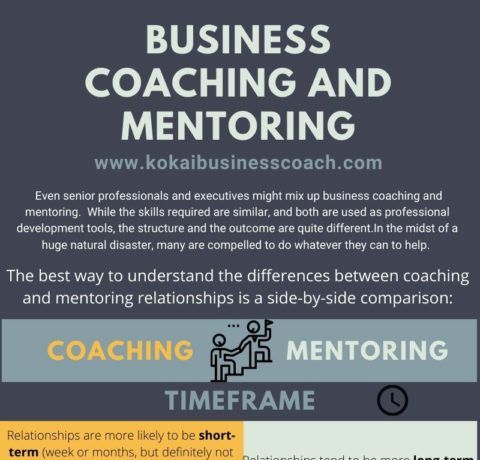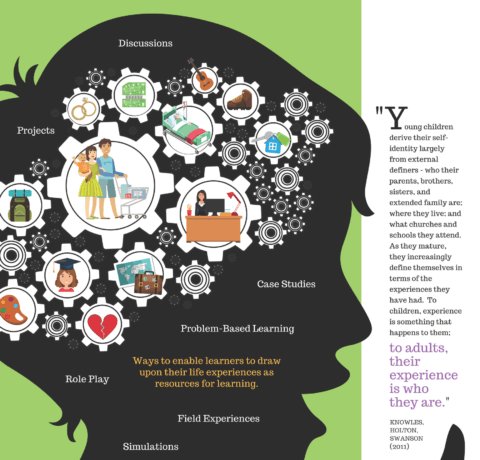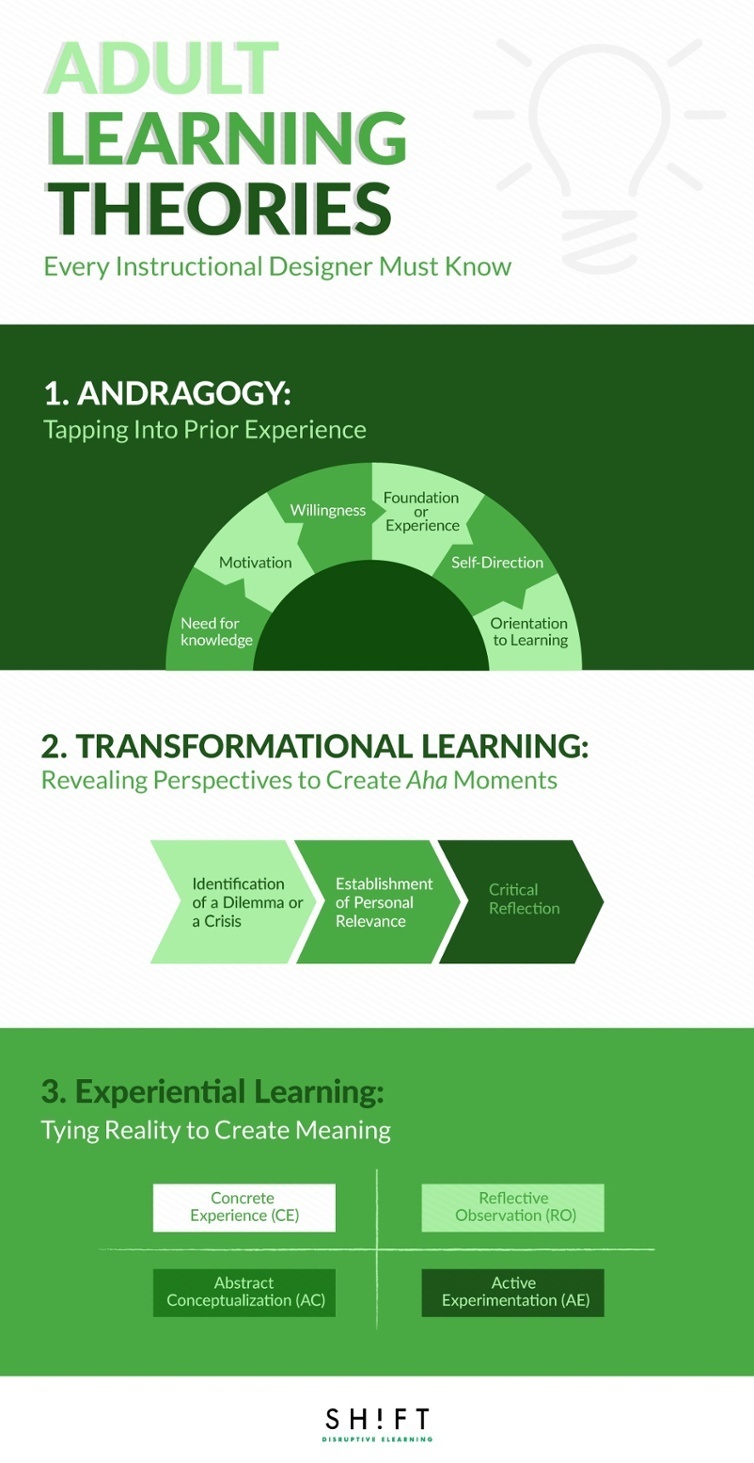Adult Learning Theories Every Instructional Designer Must Know Infographic
To facilitate learning and be an effective Instructional Designer, you MUST understand how adults learn best. When creating any type of eLearning course, it is important to base the design on a good understanding of adult learning theories.
There are many different theories of adult learning, including: andragogy, neuroscience, experiential learning, self-directed learning, and transformational learning. All these theories have one goal: they help you create effective learning experiences for the adult corporate learner.
Andragogy: Tapping Into Prior Experience
The characteristics of adult learners and how they bring in their experiences to guide them along the journey of learning from the essence of the Andragogy theory, developed by Knowles in the 1970s.
According to Knowles, adult learners differ from children in the following six ways:
- Need for Knowledge:Adults need to know “why” they should learn.
- Motivation:Adults are driven by internal motives. They will learn if they want to learn. For instance, a compelling answer to the “what’s-in-it-for-me” question is a powerful internal motivation.
- Willingness:For adults, the willingness or readiness to learn comes from perceiving the relevance of the knowledge. They want to know how learning will help them better their lives, and they learn best when they know that the knowledge has immediate value for them.
- Foundation or Experience:Adults bring with them rich reserves of experiences that form the foundation of their learning. They analyze, rationalize, synthesize, and develop new ideas or tweak old ones through the filter of their experiences. As an instructional designer, you should tap into their well of experiences to help them make connections, perceive relevance, and derive inspiration.
- Self-Direction:Adults are self-directed individuals who want to take charge of the learning journey. They are independent beings who want to feel in control.
- Orientation to Learning:Adults learn best when they “do.” They find relevance in task-oriented learning, which they can align with their workplace realities. Besides, task-oriented learning exercises their problem-solving ability that in turn, gives them the confidence that they can conquer their challenges with their newly-acquired knowledge.
Transformational Learning: Revealing Perspectives to Create Aha Moments
Transformational learning theory explains how adults learn through such aha moments. The theory is rooted in the belief that learning takes place when the new meaning is imparted to an earlier experience (Mezirow, 1990) or an old meaning is reinterpreted and seen in new light.
In the Transformational learning theory there are three stages of learning:
- Identification of a Dilemma or a Crisis: The realization that we had all along been holding on to wrong beliefs or that we don’t know what we should know is often a trigger to dig in and unearth information or review our mindsets and thought patterns. Not knowing or realizing that we have the wrong information is a crisis that is deeply upsetting to all of us. You have to point out to your learners what they don’t know to make them curious about your course.
- Establishment of Personal Relevance:This is the context or the answer to the eternal “what’s-in-it-for-me” question that inspires people and drives learning. The context can be personal, professional, or social, and you should establish it right at the beginning of the course to spike interest and reiterate it often to keep learners hooked. Adult learners are motivated to learn when they can envision the results of their efforts.
- Critical Thinking:Your learners are sensible, rational people with minds of their own. So you should create opportunities for critical reflection (premise reflection) to encourage them to re-examine their beliefs and attitudes. When you let them sort through their feelings and thoughts and realize on their own what they need to shed or tweak, they will be more willing to accept and imbibe the learning.
Experiential Learning: Tying Reality to Create Meaning
The Experiential Learning Theory states that the essence of adult learning is making sense of experiences. Adults learn best when they learn by doing. They learn best when they are directly involved with—“experiencing”—the learning instead of memorizing numbers and definitions from books.
Kolb reveals the cyclical nature of experiential learning by explaining how it takes place in four stages:
- Concrete Experience (CE):Adults learn best when the learning experience goes beyond the chalk-and-talk routine. Kinesthetic learning or learning by encouraging physical actions (simulations) and learning that evokes strong emotional responses (realistic scenarios that reveal cause-effect relationships) create powerful experiences that are not forgotten easily.
- Reflective Observation (RO):Adults need to engage with and reflect on their experiences to glean insights and acquire knowledge. So it is critical to not only create opportunities for experience-based learning but also provide time and space to encourage reflection. Create opportunities for “watching” the action unfold before the eyes (demonstrations) and “analyzing” processes and procedures (scenario-driven activities, case studies).
- Abstract Conceptualization (AC): The success of experiential learning lies in the learner being able to decode abstract concepts from their reflections, generalize these ideas, and realize the relevance to their reality. Designs assessments to encourage learners to exercise their “critical thinking” abilities, so they can formulate concepts and procedures.
- Active Experimentation (AE):Role-playing activities, internships, and other hands-on tasks let learners apply the learning and thus truly “learn by doing.” Active experimentation leads to concrete experiences, and the cycle of experiential learning resumes.
Adult learning theories help you step into the shoes of your learners and understand how their minds work. Your message has the greatest chance of hitting its mark if it is framed and presented in a language that your learners understand best.
See also:







You can adjust your cookie preferences here.